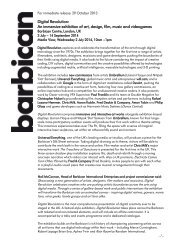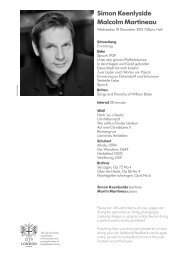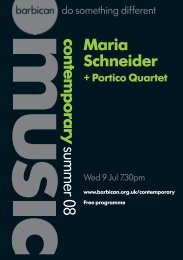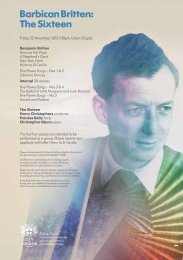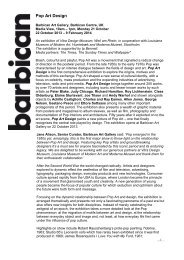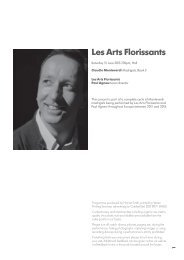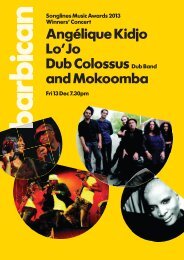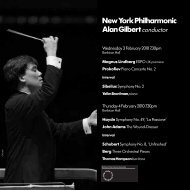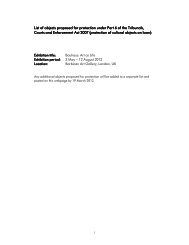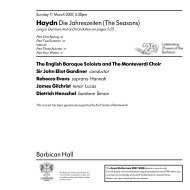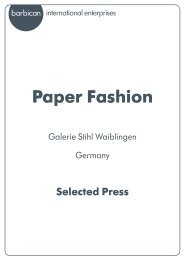Download your concert programme here - Barbican
Download your concert programme here - Barbican
Download your concert programme here - Barbican
You also want an ePaper? Increase the reach of your titles
YUMPU automatically turns print PDFs into web optimized ePapers that Google loves.
his credo thus: ‘A great artist, who<br />
possesses everything necessary to<br />
express essentials, must respect<br />
the boundaries of beauty, even if<br />
he extends them much further than<br />
hitherto’. In later years he would<br />
remark wryly, ‘My time will come<br />
after my death.’ This proved all<br />
too true: it is only in the last two<br />
decades, with first performances<br />
of his operas and recordings<br />
of most of his major works, that<br />
Zemlinsky has at last begun to<br />
emerge from the giant shadows<br />
of Mahler on the one hand and<br />
the Schoenberg-led Second<br />
Viennese School on the other.<br />
Zemlinsky had an intuitive empathy<br />
for poetry and wrote Lieder,<br />
often of strikingly concentrated<br />
intensity, throughout his career.<br />
Like Schoenberg, he entered<br />
a setting of ‘Jane Grey’ for the<br />
1907 Berlin ballad competition,<br />
and was likewise unsuccessful<br />
(the prizes went to men we would<br />
now describe as composing<br />
nonentities). Zemlinsky also<br />
shared Schoenberg’s attraction<br />
to the then daringly erotic poetry<br />
of Richard Dehmel, and in<br />
December of the same year he<br />
composed a cycle of five songs<br />
about a doomed adulterous<br />
affair. Influenced by Schoenberg’s<br />
extreme chromaticism, these<br />
disquieting, epigrammatic songs,<br />
each unified by a single keyboard<br />
motif or pattern, may have been<br />
prompted by Zemlinsky’s concern<br />
at the affair between his sister<br />
Mathilde, married to Schoenberg,<br />
and the painter Richard Gerstl.<br />
Gerstl would commit suicide after<br />
Mathilde returned to her husband<br />
in the autumn of the following<br />
year, 1908. The affair permanently<br />
damaged Zemlinsky’s relationship<br />
with Schoenberg, and, as his<br />
biographer Antony Beaumont<br />
has suggested, may have been<br />
the prime reason why he never<br />
published the Dehmel songs.<br />
Erich Korngold<br />
(1897–1957)<br />
Sterbelied, Op. 14 No. 1<br />
Das Heldengrab am<br />
Pruth, Op. 9 No. 5<br />
Was du mir bist, Op. 22 No. 1<br />
Das eilende Bächlein,<br />
Op. 27 No. 2<br />
Erich Korngold,<br />
after Johann Strauss II<br />
(1825–99)<br />
Walzer aus Wien –<br />
Frag mich oft<br />
‘I never wanted to compose. I only<br />
did it to please my father’, remarked<br />
Erich Wolfgang Korngold, perhaps<br />
a touch disingenuously. Reluctant<br />
or otherwise, the young Erich,<br />
carefully nurtured by his ambitious,<br />
domineering father Julius Korngold<br />
– Eduard Hanslick’s successor as<br />
Vienna’s most powerful music critic<br />
– was one of the most dazzling<br />
musical prodigies in history. At 5<br />
he was dubbed ‘the little Mozart’<br />
and he amazed Richard Strauss<br />
with the sophistication and finish of<br />
his compositions (‘this assurance of<br />
style, this mastery of form, this bold<br />
harmony …’). Just after Korngold’s<br />
10th birthday an equally astonished<br />
Mahler pronounced him ‘A genius!<br />
A genius!’ In adulthood the former<br />
Wunderkind would rival Richard<br />
Strauss as a composer of successful<br />
operas (Die tote Stadt, Das Wunder<br />
der Heliane) and instrumental music.<br />
After his music was condemned<br />
as ‘entartet’ – ‘degenerate’ –<br />
by the Nazis, he escaped to<br />
the United States to reinvent<br />
himself, like his contemporary<br />
Kurt Weill, as a composer for<br />
Broadway and Hollywood.<br />
Korngold wrote his first songs<br />
at 7. As a seasoned pro of 14<br />
he assembled a collection of 12<br />
Eichendorff songs as a birthday<br />
gift to his father. Five years later,<br />
in 1916, he selected three of these,<br />
added three more and published<br />
them as Sechs einfache Lieder<br />
(‘Six simple songs’), Op. 9. One of<br />
these, the not-so-simple threnody<br />
‘Das Heldengrab am Pruth’, with its<br />
bitonality (the piano right and left<br />
hands playing in keys a semitone<br />
apart) and distorted fragments<br />
of birdsong, commemorates the<br />
terrible Austrian losses on the<br />
River Prut, now in Romania. That<br />
same year, 1916, Korngold was<br />
working on the sombre, warinspired<br />
collection of Lieder des<br />
Abschieds (‘Songs of Farewell’), of<br />
which ‘Sterbelied’ sets a German<br />
translation of Christina Rossetti’s<br />
‘When I am dead, my dearest, Sing<br />
no sad songs for me’. That Richard<br />
Strauss’s admiration for Korngold<br />
was reciprocated is evident in the<br />
song’s broad, elegiac melody,<br />
luxuriant keyboard textures and<br />
side-slipping chromatic harmonies.<br />
A gorgeously decadent (very) late-<br />
Romantic chromaticism also suffuses<br />
the fervent love song ‘Was du mir<br />
bist’, from the Op. 22 collection<br />
published in 1929, when Korngold<br />
was at the zenith of his fame. ‘Das<br />
eilende Bächlein’, composed in<br />
the summer of 1933, was one of<br />
Korngold’s last songs. The imagery<br />
in Eleonore van der Straten’s<br />
carpe diem poem inevitably calls<br />
to mind Schubert’s Die schöne<br />
Müllerin, though in Korngold’s<br />
hands the ‘Bächlein’ is more surging<br />
torrent than babbling brooklet.<br />
Like his father before him, Korngold<br />
was a passionate admirer of<br />
Strauss’s operettas, making a<br />
lucrative second career in the<br />
1920s and early 1930s adapting<br />
them for the Vienna stage. With<br />
fellow-composer Julius Bittner he<br />
also concocted a pasticcio, Walzer<br />
aus Wien (adapted for Broadway<br />
as ‘The Great Waltz’), that draws<br />
on hit numbers from assorted<br />
Strauss operettas, among them the<br />
sumptuous love song ‘Frag mich oft’.<br />
Programme note © Richard Wigmore<br />
5 Programme note




